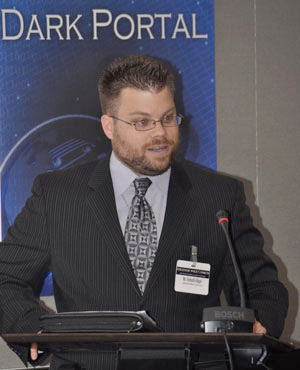Ken Kligge ’00 Develops Exercises to Prepare National Leaders for Security Challenges (web exclusive)
by Kevin Gray
“How do you sleep at night?” When Kenneth Kligge ’00 of the National Defense University hears that question, he knows he’s conducted an exercise that hit the mark. The participant said he was scared by the simulation of a national security threat.

Ken Kligge ’00 led “Dark Portal,” a training exercise on cybersecurity for Executive branch and U.S. Senate professional staff members in Washington, D.C.
At the time, Kligge’s division–the Center for Applied Strategic Learning–was new. The center was set up to conduct strategic-level crisis simulation exercises for members of Congress and senior Executive Branch officials.
“As the lead game designer for that event, I can’t think of a higher compliment,” Kligge says. “By scaring him with a scenario that very well could occur, I made an impression. His job would be to work on how to prevent a situation like the one presented.”
NDU’s mission is to prepare military and civilian leaders from the United States and other countries to evaluate national and international security challenges through multi-disciplinary educational and research programs, professional exchanges, and outreach.
“We create exercises for myriad participants inside and outside of government,” Kligge explains. “The exercise is both art and science. We read and research a lot of data, from all over the world in some cases.” Depending on the topic, this may include reports from the U.S. government, other governments, international organizations, non-governmental organizations, or the private sector.
“We want to gain a complete picture—or as close to ground truth as we can—about how all actors are thinking about a problem,” notes Kligge. “Then, as ‘gamers,’ we take the knowledge gained and look for gaps, seams, and points of convergence and divergence, and incorporate that into an event that will stress the system.”
Kligge and his colleagues guide participants through the exercise by providing them with objectives and questions for their discussion—all with the ultimate goal of enhancing the dialogue on national security issues and policies.
As a research and policy analyst, Kligge is responsible for all elements of game development, such as research; writing objectives, questions, scenarios, and supporting documents; creating graphics and/or video; facilitating exercises; and writing “after action reports.” In January 2010, he was also appointed interim director of the Strategic Policy Integration Division, which houses the Strategic Policy Forum program.
“I’ve worked hard at creating the ground for a follow-on program that is even more responsive to the administration and its needs, while still ensuring that members of Congress and their professional and personal staffs have the opportunity to discuss key national security challenges in an open and not-for-attribution setting,” he says.
The follow-on program—the National Security Policy Analysis Forum—will be conducted in greater collaboration with the Office of the Under Secretary of Defense for Policy, national security staff at the White House, and others to look at mid- to long-range issues of national concern.
Kligge holds a master’s in international affairs, security studies from George Washington University’s Elliott School of International Affairs.
He said his experience at Lafayette gave him the ability to be “bull-nosed when required, quiet when demanded, and always focused on where I want to be.”